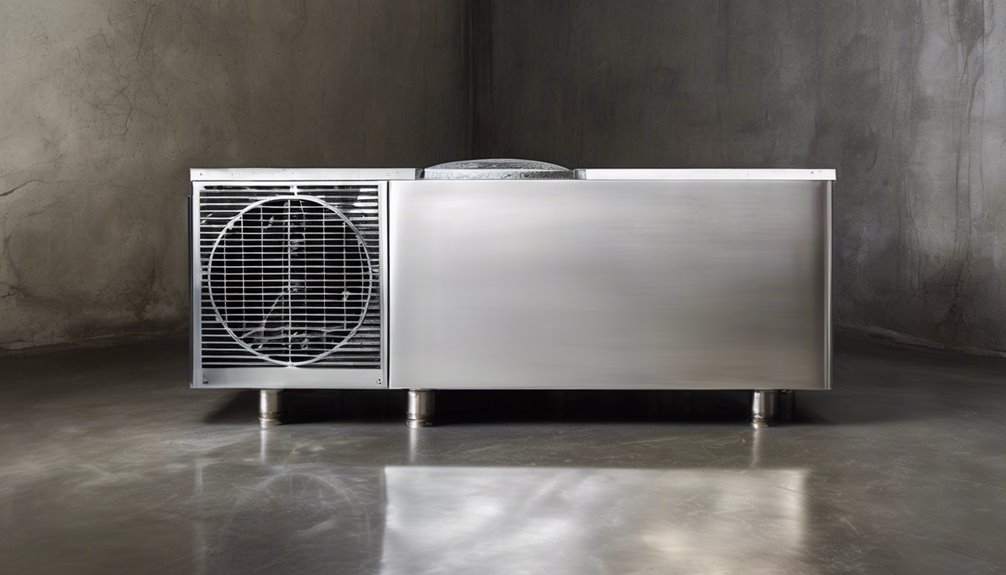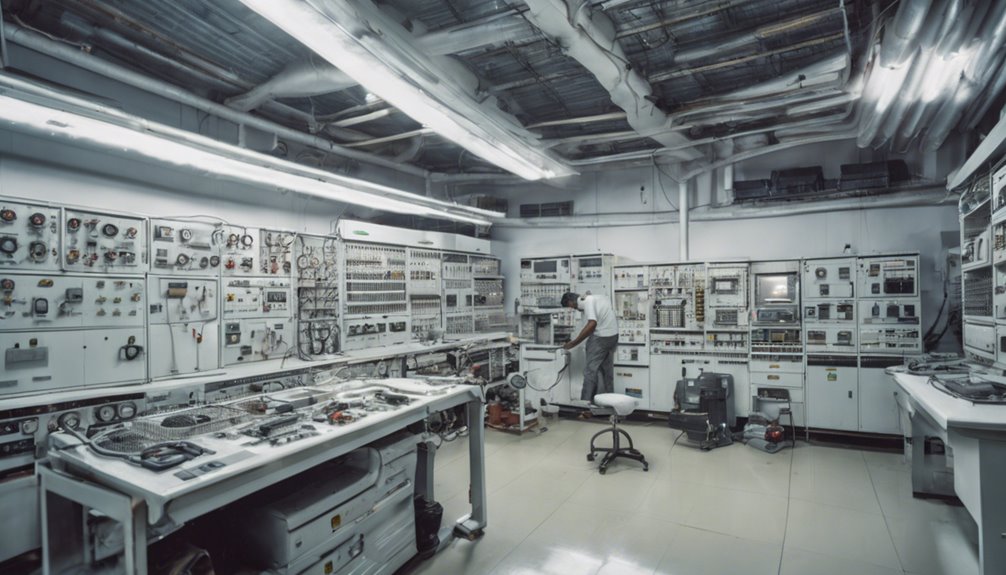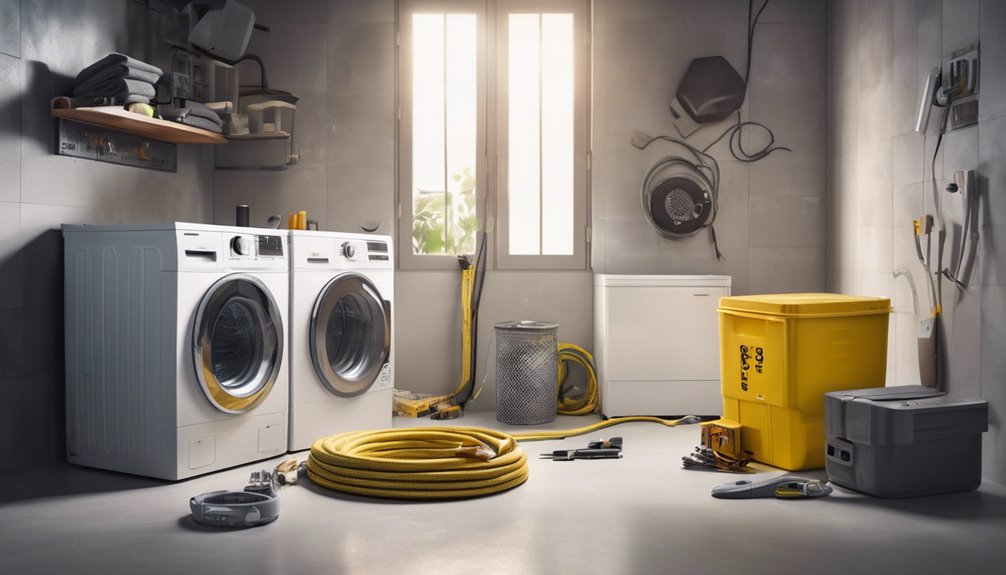Your AC drain pan is full of water because one or more of the critical components of your air conditioning system have failed. It could be clogged air filters, condensate drainage system issues, incorrect installation or slope, refrigerant leaks, or blocked drain lines. These common culprits can cause water to accumulate in the drain pan, leading to potential water damage and increased energy bills. To get to the bottom of the issue, you'll need to investigate further to determine the root cause and take corrective action.
Key Takeaways
- A clogged air filter can cause the AC to produce more condensate, leading to water accumulation in the drain pan.
- Issues with the condensate drainage system, such as kinked or blocked tubes, can impede water flow and cause the pan to fill up.
- Incorrect installation or slope of the AC unit can disrupt condensate drainage, resulting in water accumulation in the drain pan.
- Refrigerant leaks can cause ice buildup on coils, leading to condensate water accumulation in the drain pan.
- Clogged drain lines due to debris, mineral buildup, algae growth, or insect infestation can also cause water to back up into the drain pan.
Clogged Air Filters: The Hidden Culprit
Your air conditioner's drain pan is overflowing with water, and you're stumped.
Before you start blaming the drainage system, take a step back and consider a more obvious culprit: your air filters.
Don't jump to conclusions about the drainage system, consider a more likely suspect: your air filters.
Poor filter maintenance can lead to a buildup of dirt and debris, causing your AC to work harder and produce more condensate. This excess moisture can then overflow into the drain pan.
Additionally, dirty coils can also contribute to this issue.
When coils are clogged with dirt and dust, they can't dissipate heat efficiently, leading to increased condensation.
Condensate Drainage System Issues
Since you've ruled out clogged air filters as the cause of your overflowing drain pan, it's time to investigate the condensate drainage system itself.
Now, you need to check if the system is functioning correctly. A poorly designed drainage system can lead to condensate overflow, causing water to accumulate in the drain pan.
You should inspect the system's design to ensure it's properly sized for your AC unit. Check if the drainage tubes are kinked, blocked, or restricted in any way, as this can impede water flow and cause the pan to fill up.
Make sure the system is properly connected to the AC unit and that all fittings are secure. By ruling out these potential issues, you'll be one step closer to identifying the root cause of your overflowing drain pan.
Incorrect Installation or Slope
Improper installation or an incorrect slope can wreak havoc on your condensate drainage system, leading to water accumulation in the drain pan.
When your AC unit is installed, it's essential that the condensate drainage system is sloped correctly to allow water to flow freely. If the unit isn't installed with the proper pitch, water can accumulate in the drain pan.
Proper slope is crucial during AC installation to ensure condensate drainage flows freely and prevents water accumulation in the drain pan.
Poor craftsmanship can also lead to incorrect installation, resulting in water buildup. You may not even notice the issue until you see water overflowing from the drain pan or notice water damage around the unit.
Check your AC unit's installation to ensure it's properly sloped to prevent water accumulation.
Refrigerant Leaks and Ice Buildup
Refrigerant leaks can cause liquid to enter the air conditioning system, leading to ice buildup on the coils.
When refrigerant leaks occur, the liquid refrigerant migrates to the freezer coils, causing them to freeze. As a result, condensate water accumulates and flows into the drain pan.
If you notice ice forming on the coils or water accumulating in the drain pan, it may indicate a refrigerant leak. It's essential to address this issue promptly, as it can lead to further damage and increased energy bills.
Have a professional technician inspect and repair the leak to prevent further ice buildup and water accumulation in your AC drain pan.
Blocked or Clogged Drain Lines
Clogged air conditioning drain lines can wreak havoc on your system, causing water to back up into the drain pan.
If you're experiencing a full drain pan, it's essential to check your drain lines for blockages. You might be wondering what's causing the clog.
Here are some common culprits:
- Debris accumulation: dirt, dust, and other particles can accumulate in your drain lines over time
- Mineral buildup: hard water can leave behind mineral deposits that restrict water flow
- Algae growth: moisture in the drain lines can create an ideal environment for algae growth
- Insect infestation: insects like ants or cockroaches might be nesting in your drain lines
- Improper installation: if your AC system wasn't installed correctly, it can lead to drainage issues
Frequently Asked Questions
Can I Use a Wet/Dry Vacuum to Remove Water From the Drain Pan?
You can use a wet/dry vacuum to remove water from the drain pan, but make sure to inspect the pan for blockages first. Regular vacuum maintenance and pan inspection will help prevent future water buildup and ensure your AC runs smoothly.
How Often Should I Clean the AC Drain Pan to Prevent Water Buildup?
You should perform regular maintenance on your AC drain pan to prevent water buildup, including seasonal checks to ensure it's clear of debris, and clean it every 1-3 months depending on usage and climate.
Will a Full Drain Pan Affect My Electricity Bill or AC Performance?
You're wondering if a full drain pan will hike your electricity bill or impact your AC's performance. Yes, it can increase energy consumption and reduce cooling capacity, making your AC work harder and less efficiently.
Can I Use Bleach to Clean and Disinfect the AC Drain Pan?
When cleaning your AC drain pan, you can use bleach to combat mold growth, but be cautious not to let it sit too long, as it can accelerate pan rust – mix it with water and scrub gently instead.
Are AC Drain Pan Water Alarms Worth the Investment for Homeowners?
You're wondering if investing in an AC drain pan water alarm is worth it. These alarms can provide peace of mind, but be prepared for occasional false alarms. However, some insurance companies offer discounts for having them, making it a worthwhile investment for you.
Conclusion
So, you're left wondering why your AC drain pan is full of water. It's frustrating, but there's a fix. Review your air filters, check the condensate drainage system, ensure proper installation and slope, inspect for refrigerant leaks and ice buildup, and clear any blockages in the drain lines. By tackling these common issues, you'll be back to cool, dry comfort in no time. Remember, staying on top of maintenance can save you from costly repairs and a flooded AC drain pan.



